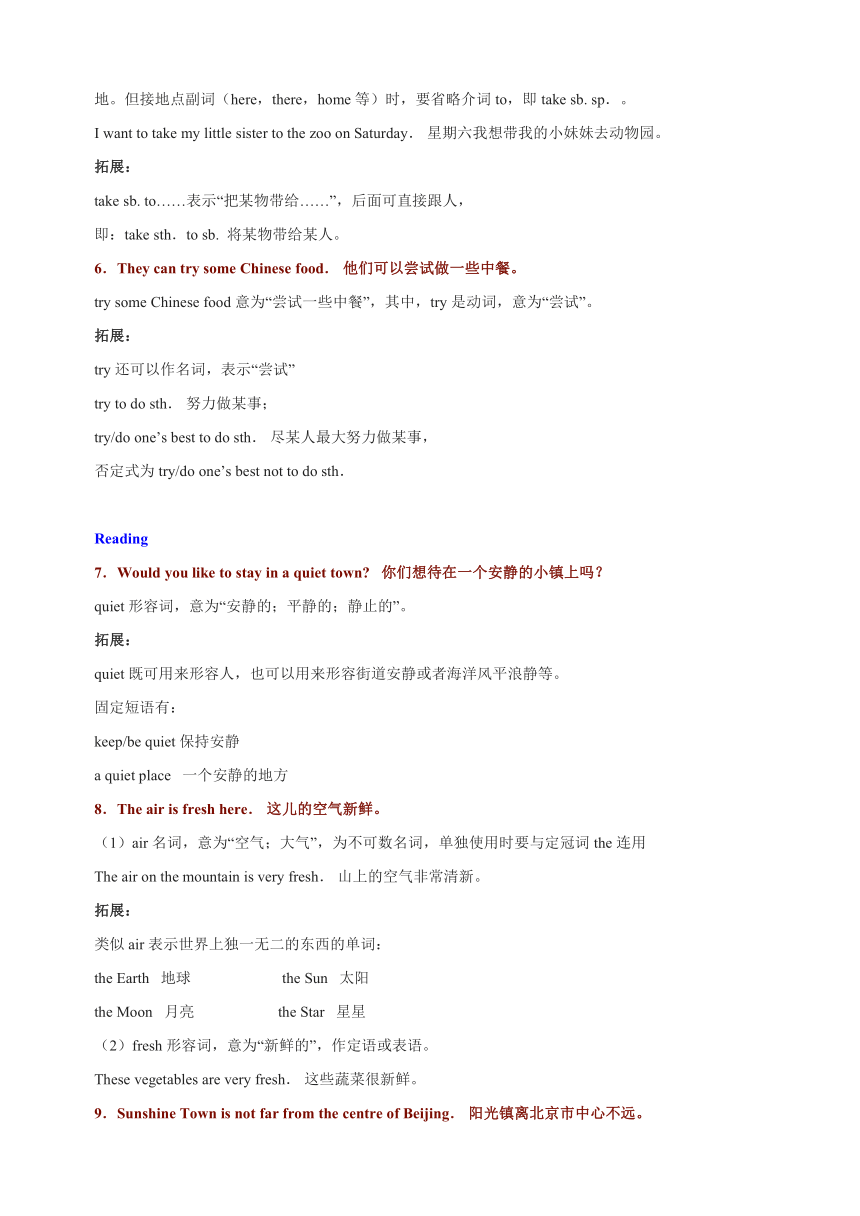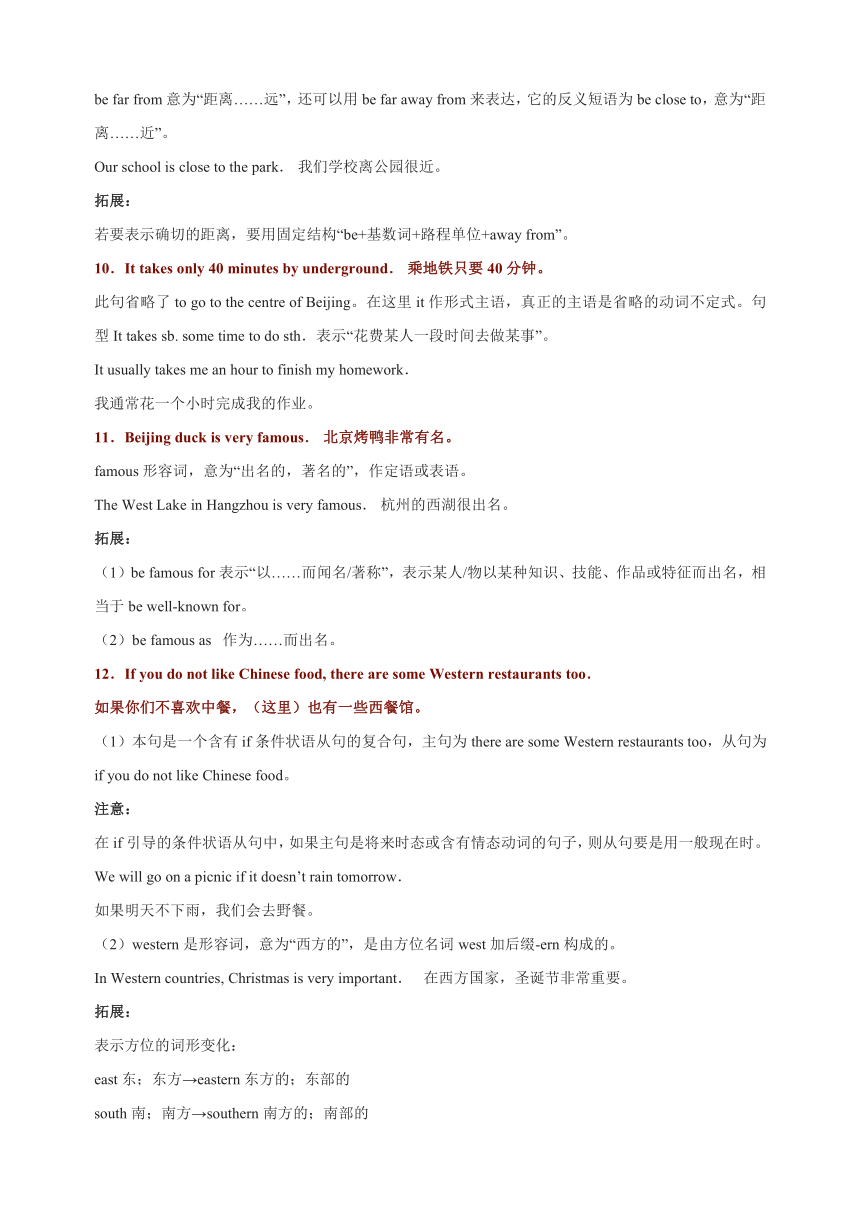译林版七年级下册英语第三单元Unit 3 Welcome to Sunshine Town 知识点详解
文档属性
| 名称 | 译林版七年级下册英语第三单元Unit 3 Welcome to Sunshine Town 知识点详解 |  | |
| 格式 | doc | ||
| 文件大小 | 52.0KB | ||
| 资源类型 | 教案 | ||
| 版本资源 | 牛津译林版 | ||
| 科目 | 英语 | ||
| 更新时间 | 2024-03-13 11:33:20 | ||
图片预览



文档简介
七年级下册英语单元知识点详解
Unit3《Welcome to Sunshine Town》
Comic strip and welcome to the unit
1.An old friend of mine is coming to see me, Hobo. 霍波,我的一位老朋友将要来看我。
an old friend of mine意为“我的一位老朋友”,是双重所有格结构。“双重所有格”形式,就是既含有“’s”结构或名词性物主代词,又含有“of短语”。“双重所有格”主要有两种用法:一种表示“部分”,另一种表示“感彩”。
the English book of your brother’s 你哥哥的英语书
2.But there’s nothing in the fridge. 但是冰箱里没有东西了。
句中nothing表示“没有东西”,相当于not anything。
Look! There is nothing in the bowl. 看!碗里什么也没有。
注意:
nothing作主语时,谓语动词用单数形式。
3.Wait a minute.请稍等。
动词短语wait a minute意为“等一会儿”,用于日常交际用语中,它的同义短语为just a minute/moment。
Wait a minute.She will go with you.
等一会儿,她和你一起去。
拓展:
wait的相关短语
wait for 等候……
wait to do 等着做
wait for sb. to do sth.等某人做某事
4.Maybe we can order a pizza. 也许我们可以点一块披萨。
maybe是副词,意为“也许,可能”,用作状语。
Maybe Simon’s answer is not right. 也许西蒙的答案不正确。
辨析:maybe与may be
maybe,常用于句子开头,表示一种可能性。
may be,may与be的组合,意为“可能是;也许是”,在句中做谓语。
5.Shall we take them to the cinema 我们可以带他们去电影院吗?
take sb. to……把某人带到……,其中to为介词,后面可以直接跟地点,即:take sb. to sp.带某人去某地。但接地点副词(here,there,home等)时,要省略介词to,即take sb. sp.。
I want to take my little sister to the zoo on Saturday. 星期六我想带我的小妹妹去动物园。
拓展:
take sb. to……表示“把某物带给……”,后面可直接跟人,
即:take sth.to sb. 将某物带给某人。
6.They can try some Chinese food. 他们可以尝试做一些中餐。
try some Chinese food 意为“尝试一些中餐”,其中,try是动词,意为“尝试”。
拓展:
try还可以作名词,表示“尝试”
try to do sth. 努力做某事;
try/do one’s best to do sth. 尽某人最大努力做某事,
否定式为try/do one’s best not to do sth.
Reading
7.Would you like to stay in a quiet town 你们想待在一个安静的小镇上吗?
quiet形容词,意为“安静的;平静的;静止的”。
拓展:
quiet既可用来形容人,也可以用来形容街道安静或者海洋风平浪静等。
固定短语有:
keep/be quiet 保持安静
a quiet place 一个安静的地方
8.The air is fresh here. 这儿的空气新鲜。
(1)air名词,意为“空气;大气”,为不可数名词,单独使用时要与定冠词the连用
The air on the mountain is very fresh. 山上的空气非常清新。
拓展:
类似air表示世界上独一无二的东西的单词:
the Earth 地球 the Sun 太阳
the Moon 月亮 the Star 星星
(2)fresh形容词,意为“新鲜的”,作定语或表语。
These vegetables are very fresh. 这些蔬菜很新鲜。
9.Sunshine Town is not far from the centre of Beijing. 阳光镇离北京市中心不远。
be far from意为“距离……远”,还可以用be far away from来表达,它的反义短语为be close to,意为“距离……近”。
Our school is close to the park. 我们学校离公园很近。
拓展:
若要表示确切的距离,要用固定结构“be+基数词+路程单位+away from”。
10.It takes only 40 minutes by underground. 乘地铁只要40分钟。
此句省略了to go to the centre of Beijing。在这里it作形式主语,真正的主语是省略的动词不定式。句型It takes sb. some time to do sth.表示“花费某人一段时间去做某事”。
It usually takes me an hour to finish my homework.
我通常花一个小时完成我的作业。
11.Beijing duck is very famous. 北京烤鸭非常有名。
famous形容词,意为“出名的,著名的”,作定语或表语。
The West Lake in Hangzhou is very famous. 杭州的西湖很出名。
拓展:
(1)be famous for表示“以……而闻名/著称”,表示某人/物以某种知识、技能、作品或特征而出名,相当于be well-known for。
(2)be famous as 作为……而出名。
12.If you do not like Chinese food, there are some Western restaurants too.
如果你们不喜欢中餐,(这里)也有一些西餐馆。
(1)本句是一个含有if条件状语从句的复合句,主句为there are some Western restaurants too,从句为if you do not like Chinese food。
注意:
在if引导的条件状语从句中,如果主句是将来时态或含有情态动词的句子,则从句要是用一般现在时。
We will go on a picnic if it doesn’t rain tomorrow.
如果明天不下雨,我们会去野餐。
(2)western是形容词,意为“西方的”,是由方位名词west加后缀-ern构成的。
In Western countries, Christmas is very important. 在西方国家,圣诞节非常重要。
拓展:
表示方位的词形变化:
east东;东方→eastern东方的;东部的
south南;南方→southern南方的;南部的
north北;北方→northern北方的;北部的
13.Why not visit our local theatre and enjoy Beijing opera 为什么不参观我们当地的剧院,去欣赏京剧呢?
“Why not + 动词原形 + 其他 ”意为“为什么不……呢?”是常用来向对方提出建议的一种句型。相当于Why don’t you + 动词原形 + 其他?
Why not go fishing with me = Why don’t you go fishing with me 为什么不和我一起去钓鱼呢?
Why not come earlier = Why don’t you come earlier 为什么不早点来呢?
拓展:
表示建议、邀请的句型:
You’d better……你最好……
Shall we…… 我们……好吗?
Let's…… 让我们……吧!
Why don’t you/not…… 为什么不……呢?
What/How about…… ……怎么样?
Will/Would/Could you please…… 请你……好吗?
14.If you want to learn more about Chinese art, don’t miss the opera shows there.
如果你想要更多地了解中国文化,不要错过那儿的戏剧表演。
miss动词,意为“错过,失去”。
He often gets up late and misses the early bus. 他经常晚起错过早班公共汽车。
拓展:
(1)miss作动词,还可以表示“想念,思念”。
(2)若miss首字母大写,即Miss,表示“小姐”,指未婚女子,常用于姓氏的前面。
15.We are looking forward to meeting you soon. 我们期待尽快见到你们。
look forward to doing sth.意为“期待做某事”,to是介词,后面跟动词时,必须用-ing形式。
I’m looking forward to seeing you this summer vacation. 我盼望今年暑假见到你。
拓展:
look forward to后面也可以接名词或者代词。
The children are looking forward to Children’s Day. 孩子们正在期盼儿童节。
Grammar
16.Whose postcards are these 这些是谁的明信片?
(1)whose代词,意为“谁的”,在句中可做表语和定语。
Whose is this key ring 这个钥匙扣是谁的?
(2)postcard是合成词,意为“明信片”,其复数形式是postcards。它是由post加card构成。
classroom(教室)=class(班级)+room(房间)
classmate(同学)=class(班级)+mate(伙伴)
blackboard(黑板)=black(黑色的)+board(木板)
beside(床边)=bed(床)+side(边)
playground(操场)=play(玩)+ground(地面)
cupboard(碗橱)=cup(茶杯)+board(板)
bookcase(书架)=book(书)+case(箱,盒)
bathroom(浴室)=bath(洗澡)+room(房间)
17.Whose key ring is that 那是谁的钥匙扣?
(1)key名词,意为“钥匙”,复数为keys。
There are three keys in my bag. 我包里有三把钥匙。
拓展:
key作名词,还可以表示“答案;键;关键”,
the key to……意为“……的答案”。
18.They’re all over the place. 它们到处都是。
all over 后面加上表示地点的名词,意为“到处,遍及”。
My dream is to travel all over the world. 我的梦想是游遍全世界。
拓展:
all over可单独使用,表示“浑身;全身上下”。
Integrated skills
19.the golden throne 金銮宝座
golden是形容词,意为“金质的;金色的”,可以作表语或定语。
This hat is golden. 这顶帽子是金质的。。
拓展:
golden的名词为gold,意为“金钱,财富,金色”。
20.works of art 艺术品
works of art意为“艺术品”。
work用复数形式时,意为“著作;作品”。
There are many works of art in the museum. 在这座博物馆里面有许多艺术品。
拓展:
work一词多义:
(1)工作,劳动,不可数名词。
(2)工作,动词。
(3)奏效,起作用,动词。
21.Chinese paintings 中国画
名词painting意为“绘画,油画”,复数为paintings。
Qi Baishi is good at drawing Chinese painting. 齐白石擅长画中国画。
拓展:
paint是painting的动词形式,意为“刷,涂,绘画”,而painter则是表示职业的名词,意为“画家,油漆工”。
22.We can row a boat on the lake. 我们可以在湖上划船。
动词短语row a boat意为“划船”。row作动词,意为“划(船)”。
Can you teach me how to row a boat 你可以教我怎样划船吗?
拓展:
row还可以作名词,意为“行,排”。
23.How far is it from the hotel 它离宾馆有多远?
疑问词how far意为“多远”,用于对距离的提问。
- How far is it from your school to your home 你家离学校多远?
- It’s only 10 minutes’ walk. 步行只需10分钟。
辨析:how far 和how long
how far,意为“多远”,用来询问距离,指路程的远近。
how long,意为“多长”,既可以询问时间,也能询问物体的长度。
Study skills&Task
24.Mr Li owns a four-bedroom flat. 李先生拥有一套四个卧室的公寓。
own是行为动词,意为“拥有,所有。”
Some day I will own a shop like this. 有一天,我将会拥有一个像这样的商店。
拓展:
owner是由动词own加上后缀-er变化而来的名词,意为“所有者;主人”。
25.raise cows 饲养奶牛
raise动词,意为“饲养”,后面直接跟宾语,
raise children抚养孩子。
Most students in our class raise pets. 我们班大多数学生饲养宠物。
26.Every day, I can smell the flowers and hear the birds sing.每天,我能闻到花香,听到鸟儿唱歌。
(1)smell动词,意为“闻;嗅”,后接名词或代词作宾语。
Smell it and tell me what it is. 你闻闻看,告诉我是什么。
smell还可用作连系动词,后常接形容词作表语。
Do these flowers smell sweet 这些花闻起来香吗?
(2)短语hear the birds sing意为“听到鸟儿唱歌”。其中hear是感官动词,后面接省去to的动词不定式,即hear sb. do sth.,意为“听到某人做了某事”。
often hear the little girl sing in the next room. 我经常听见这个小女孩在隔壁房间唱歌。
拓展:
hear sb. doing sth.表示“听见某人正在做某事”,强调动作正在进行。
27.Some families raise cows, and others grow wheat. 一些家庭饲养奶牛,另一些家庭种植小麦。
句型some……,and others……意为“一些……,另一些……”。
Some boys are playing basketball, and others are playing volleyball.一些男生在打篮球,另一些在打排球。
28.They are all friendly. 他们都非常友好。
形容词friendly 表示“有好的”,其近义词是nice或kind。be friendly to sb. 意为“对某人友好”。
Our teachers are very friendly to us.= Our teachers are very nice/ kind to us.我们的老师对我们很友好。
29.Usually my mother drives us there to do the shopping.通常妈妈开车带我们去那里购物。
动词drive意为“驾驶,开(车),驾车送(人)”。
I don’t know how to drive a car. 我不知道如何开车。
拓展:
drive sb. to……表示“开车送某人去……”。
Unit3《Welcome to Sunshine Town》
Comic strip and welcome to the unit
1.An old friend of mine is coming to see me, Hobo. 霍波,我的一位老朋友将要来看我。
an old friend of mine意为“我的一位老朋友”,是双重所有格结构。“双重所有格”形式,就是既含有“’s”结构或名词性物主代词,又含有“of短语”。“双重所有格”主要有两种用法:一种表示“部分”,另一种表示“感彩”。
the English book of your brother’s 你哥哥的英语书
2.But there’s nothing in the fridge. 但是冰箱里没有东西了。
句中nothing表示“没有东西”,相当于not anything。
Look! There is nothing in the bowl. 看!碗里什么也没有。
注意:
nothing作主语时,谓语动词用单数形式。
3.Wait a minute.请稍等。
动词短语wait a minute意为“等一会儿”,用于日常交际用语中,它的同义短语为just a minute/moment。
Wait a minute.She will go with you.
等一会儿,她和你一起去。
拓展:
wait的相关短语
wait for 等候……
wait to do 等着做
wait for sb. to do sth.等某人做某事
4.Maybe we can order a pizza. 也许我们可以点一块披萨。
maybe是副词,意为“也许,可能”,用作状语。
Maybe Simon’s answer is not right. 也许西蒙的答案不正确。
辨析:maybe与may be
maybe,常用于句子开头,表示一种可能性。
may be,may与be的组合,意为“可能是;也许是”,在句中做谓语。
5.Shall we take them to the cinema 我们可以带他们去电影院吗?
take sb. to……把某人带到……,其中to为介词,后面可以直接跟地点,即:take sb. to sp.带某人去某地。但接地点副词(here,there,home等)时,要省略介词to,即take sb. sp.。
I want to take my little sister to the zoo on Saturday. 星期六我想带我的小妹妹去动物园。
拓展:
take sb. to……表示“把某物带给……”,后面可直接跟人,
即:take sth.to sb. 将某物带给某人。
6.They can try some Chinese food. 他们可以尝试做一些中餐。
try some Chinese food 意为“尝试一些中餐”,其中,try是动词,意为“尝试”。
拓展:
try还可以作名词,表示“尝试”
try to do sth. 努力做某事;
try/do one’s best to do sth. 尽某人最大努力做某事,
否定式为try/do one’s best not to do sth.
Reading
7.Would you like to stay in a quiet town 你们想待在一个安静的小镇上吗?
quiet形容词,意为“安静的;平静的;静止的”。
拓展:
quiet既可用来形容人,也可以用来形容街道安静或者海洋风平浪静等。
固定短语有:
keep/be quiet 保持安静
a quiet place 一个安静的地方
8.The air is fresh here. 这儿的空气新鲜。
(1)air名词,意为“空气;大气”,为不可数名词,单独使用时要与定冠词the连用
The air on the mountain is very fresh. 山上的空气非常清新。
拓展:
类似air表示世界上独一无二的东西的单词:
the Earth 地球 the Sun 太阳
the Moon 月亮 the Star 星星
(2)fresh形容词,意为“新鲜的”,作定语或表语。
These vegetables are very fresh. 这些蔬菜很新鲜。
9.Sunshine Town is not far from the centre of Beijing. 阳光镇离北京市中心不远。
be far from意为“距离……远”,还可以用be far away from来表达,它的反义短语为be close to,意为“距离……近”。
Our school is close to the park. 我们学校离公园很近。
拓展:
若要表示确切的距离,要用固定结构“be+基数词+路程单位+away from”。
10.It takes only 40 minutes by underground. 乘地铁只要40分钟。
此句省略了to go to the centre of Beijing。在这里it作形式主语,真正的主语是省略的动词不定式。句型It takes sb. some time to do sth.表示“花费某人一段时间去做某事”。
It usually takes me an hour to finish my homework.
我通常花一个小时完成我的作业。
11.Beijing duck is very famous. 北京烤鸭非常有名。
famous形容词,意为“出名的,著名的”,作定语或表语。
The West Lake in Hangzhou is very famous. 杭州的西湖很出名。
拓展:
(1)be famous for表示“以……而闻名/著称”,表示某人/物以某种知识、技能、作品或特征而出名,相当于be well-known for。
(2)be famous as 作为……而出名。
12.If you do not like Chinese food, there are some Western restaurants too.
如果你们不喜欢中餐,(这里)也有一些西餐馆。
(1)本句是一个含有if条件状语从句的复合句,主句为there are some Western restaurants too,从句为if you do not like Chinese food。
注意:
在if引导的条件状语从句中,如果主句是将来时态或含有情态动词的句子,则从句要是用一般现在时。
We will go on a picnic if it doesn’t rain tomorrow.
如果明天不下雨,我们会去野餐。
(2)western是形容词,意为“西方的”,是由方位名词west加后缀-ern构成的。
In Western countries, Christmas is very important. 在西方国家,圣诞节非常重要。
拓展:
表示方位的词形变化:
east东;东方→eastern东方的;东部的
south南;南方→southern南方的;南部的
north北;北方→northern北方的;北部的
13.Why not visit our local theatre and enjoy Beijing opera 为什么不参观我们当地的剧院,去欣赏京剧呢?
“Why not + 动词原形 + 其他 ”意为“为什么不……呢?”是常用来向对方提出建议的一种句型。相当于Why don’t you + 动词原形 + 其他?
Why not go fishing with me = Why don’t you go fishing with me 为什么不和我一起去钓鱼呢?
Why not come earlier = Why don’t you come earlier 为什么不早点来呢?
拓展:
表示建议、邀请的句型:
You’d better……你最好……
Shall we…… 我们……好吗?
Let's…… 让我们……吧!
Why don’t you/not…… 为什么不……呢?
What/How about…… ……怎么样?
Will/Would/Could you please…… 请你……好吗?
14.If you want to learn more about Chinese art, don’t miss the opera shows there.
如果你想要更多地了解中国文化,不要错过那儿的戏剧表演。
miss动词,意为“错过,失去”。
He often gets up late and misses the early bus. 他经常晚起错过早班公共汽车。
拓展:
(1)miss作动词,还可以表示“想念,思念”。
(2)若miss首字母大写,即Miss,表示“小姐”,指未婚女子,常用于姓氏的前面。
15.We are looking forward to meeting you soon. 我们期待尽快见到你们。
look forward to doing sth.意为“期待做某事”,to是介词,后面跟动词时,必须用-ing形式。
I’m looking forward to seeing you this summer vacation. 我盼望今年暑假见到你。
拓展:
look forward to后面也可以接名词或者代词。
The children are looking forward to Children’s Day. 孩子们正在期盼儿童节。
Grammar
16.Whose postcards are these 这些是谁的明信片?
(1)whose代词,意为“谁的”,在句中可做表语和定语。
Whose is this key ring 这个钥匙扣是谁的?
(2)postcard是合成词,意为“明信片”,其复数形式是postcards。它是由post加card构成。
classroom(教室)=class(班级)+room(房间)
classmate(同学)=class(班级)+mate(伙伴)
blackboard(黑板)=black(黑色的)+board(木板)
beside(床边)=bed(床)+side(边)
playground(操场)=play(玩)+ground(地面)
cupboard(碗橱)=cup(茶杯)+board(板)
bookcase(书架)=book(书)+case(箱,盒)
bathroom(浴室)=bath(洗澡)+room(房间)
17.Whose key ring is that 那是谁的钥匙扣?
(1)key名词,意为“钥匙”,复数为keys。
There are three keys in my bag. 我包里有三把钥匙。
拓展:
key作名词,还可以表示“答案;键;关键”,
the key to……意为“……的答案”。
18.They’re all over the place. 它们到处都是。
all over 后面加上表示地点的名词,意为“到处,遍及”。
My dream is to travel all over the world. 我的梦想是游遍全世界。
拓展:
all over可单独使用,表示“浑身;全身上下”。
Integrated skills
19.the golden throne 金銮宝座
golden是形容词,意为“金质的;金色的”,可以作表语或定语。
This hat is golden. 这顶帽子是金质的。。
拓展:
golden的名词为gold,意为“金钱,财富,金色”。
20.works of art 艺术品
works of art意为“艺术品”。
work用复数形式时,意为“著作;作品”。
There are many works of art in the museum. 在这座博物馆里面有许多艺术品。
拓展:
work一词多义:
(1)工作,劳动,不可数名词。
(2)工作,动词。
(3)奏效,起作用,动词。
21.Chinese paintings 中国画
名词painting意为“绘画,油画”,复数为paintings。
Qi Baishi is good at drawing Chinese painting. 齐白石擅长画中国画。
拓展:
paint是painting的动词形式,意为“刷,涂,绘画”,而painter则是表示职业的名词,意为“画家,油漆工”。
22.We can row a boat on the lake. 我们可以在湖上划船。
动词短语row a boat意为“划船”。row作动词,意为“划(船)”。
Can you teach me how to row a boat 你可以教我怎样划船吗?
拓展:
row还可以作名词,意为“行,排”。
23.How far is it from the hotel 它离宾馆有多远?
疑问词how far意为“多远”,用于对距离的提问。
- How far is it from your school to your home 你家离学校多远?
- It’s only 10 minutes’ walk. 步行只需10分钟。
辨析:how far 和how long
how far,意为“多远”,用来询问距离,指路程的远近。
how long,意为“多长”,既可以询问时间,也能询问物体的长度。
Study skills&Task
24.Mr Li owns a four-bedroom flat. 李先生拥有一套四个卧室的公寓。
own是行为动词,意为“拥有,所有。”
Some day I will own a shop like this. 有一天,我将会拥有一个像这样的商店。
拓展:
owner是由动词own加上后缀-er变化而来的名词,意为“所有者;主人”。
25.raise cows 饲养奶牛
raise动词,意为“饲养”,后面直接跟宾语,
raise children抚养孩子。
Most students in our class raise pets. 我们班大多数学生饲养宠物。
26.Every day, I can smell the flowers and hear the birds sing.每天,我能闻到花香,听到鸟儿唱歌。
(1)smell动词,意为“闻;嗅”,后接名词或代词作宾语。
Smell it and tell me what it is. 你闻闻看,告诉我是什么。
smell还可用作连系动词,后常接形容词作表语。
Do these flowers smell sweet 这些花闻起来香吗?
(2)短语hear the birds sing意为“听到鸟儿唱歌”。其中hear是感官动词,后面接省去to的动词不定式,即hear sb. do sth.,意为“听到某人做了某事”。
often hear the little girl sing in the next room. 我经常听见这个小女孩在隔壁房间唱歌。
拓展:
hear sb. doing sth.表示“听见某人正在做某事”,强调动作正在进行。
27.Some families raise cows, and others grow wheat. 一些家庭饲养奶牛,另一些家庭种植小麦。
句型some……,and others……意为“一些……,另一些……”。
Some boys are playing basketball, and others are playing volleyball.一些男生在打篮球,另一些在打排球。
28.They are all friendly. 他们都非常友好。
形容词friendly 表示“有好的”,其近义词是nice或kind。be friendly to sb. 意为“对某人友好”。
Our teachers are very friendly to us.= Our teachers are very nice/ kind to us.我们的老师对我们很友好。
29.Usually my mother drives us there to do the shopping.通常妈妈开车带我们去那里购物。
动词drive意为“驾驶,开(车),驾车送(人)”。
I don’t know how to drive a car. 我不知道如何开车。
拓展:
drive sb. to……表示“开车送某人去……”。
